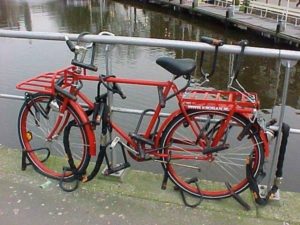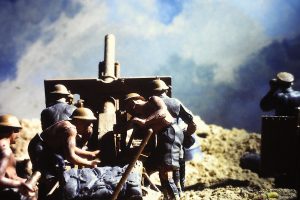Laatst verscheen een artikel dat enkele ‘misvattingen’ (quod non) over metaforen poogde te ‘corrigeren’ (quod non). Het betrof de vermeende oorsprong van de uitdrukkingen:
1. It ain’t over till the fat lady sings;
2. Par;
3. Scratch;
4. Op zijn elfendertigst.
Om punt 4 te maken (ongebruikelijk om zo uitgebreid letterlijk maar zonder bronvermelding te citeren van https://onzetaal.nl/taaladvies/op-zn-elfendertigst), worden de overige drie oorsprongen dermate verhaspeld – ik druk me voorzichtig uit – dat het wel een persiflage lijkt.
En waarom de metaforen misplaatst zouden zijn of tot verkeerd gebruik leiden, wordt nergens duidelijk. Ongeacht de oorsprong worden ze toch gebruikt zoals eenieder ze begrijpt, dus what’s the problem ..? Alternatieve alliteratie acht de lezende lezersgroep leuker.
The fat lady sings
Zou niet zijn afgeleid van de operawereld, want er zijn opera’s waar de aria van de diva niet als laatste werd/wordt gezongen. Rrright. Terwijl overal en nergens (nou ja, overal; nergens niet) duidelijk wordt dat het wél gaat om opera’s, soms in de letterlijke betekenis (met name Brünhilde wordt genoemd – terecht, als zij als laatste een vierdaagse opera afsluit; it ain’t over till the fat lady sings is dan een prima aanduiding…), soms in de figuurlijke (namelijk de laatste inhoudelijk, qua plot, belangrijke aria). Met een paar bronnetjes (altijd handig):
https://www.theguardian.com/notesandqueries/query/0,5753,-7176,00.html
https://www.theguardian.com/notesandqueries/query/0,5753,-20449,00.html
https://idiomorigins.org/origin/its-not-over-till-the-fat-lady-sings
https://grammarist.com/idiom/it-aint-over-till-the-fat-lady-sings
https://wordhistories.net/2020/12/21/fat-lady-sings
https://www.trouw.nl/nieuws/wie-is-die-fat-lady-eigenlijk~b00fac11
https://en.wikipedia.org/wiki/It_ain’t_over_till_the_fat_lady_sings
https://www.chicagotribune.com/news/ct-xpm-1987-11-22-8703280340-story.html
Dat de uitdrukking eigenlijk “it ain’t over till the fat lady sinks” zou zijn, verwijzend naar een 8-ball bij pool die a. een bijnaam fat lady zou hebben naar de gelijkenis tussen een cijfer 8 en een fat lady (quod non; een fat lady heeft geen taille!) zoals aan de Zuid-Engelse kust een bingomaster ‘two fat ladies’ zou roepen bij bal 88 – uiterst zeldzaam (als in: niet-bestaand), een bingospel met nummers boven de 75..! (het Nederlandse kienen heeft er 90 ja maar wat doet data an de Zuid-Engelse kust..!?); b. als laatste moet worden gepot; tsja dat is leuk bedacht maar lijkt me meer iets voor een karakteriserende verspreking van een sitcomkarakter dat taalkundig niet al te snugger is.
Uit-ge-breid zoeken als zou de 8-ball bij pool ‘fat lady’ worden genoemd, levert nul komma nulnul zoekresultaat! Wél de bijnaam ‘money ball’.
Par
We kunnen het kort houden: https://www.theguardian.com/notesandqueries/query/0,5753,-20449,00.html – nadere toelichting overbodig. Noot: “par for the course” was een gebruikelijke uitdrukking in zakelijk verkeer, eind Jaren ’80 zeker (al), als dooddoener dat ‘het’ (essentieel element, al of niet negatief) er nu eenmaal bij hoort.
Dus dat de term in tegenstelling zou afstammen van ‘professionals’ average result’ is gewoonweg onzin. Later is dat er weleens bijgehaald ja, maar wie leert golfen, leert ook dat dat later erbij gehaald is. En wie een spat luistert, weet ook van beginnend golfer af dat nieuwe banen worden ontworpen voor een bepaalde score. Soms wordt die achteraf aangepast, als te veel professionals (en scratch (zie hierna) spelende amateurs!) met scratch handicap onder de baan komen. Om te voorkomen dat negatieve handicaps nodig zouden zijn.
Scratch
Ook hier kunnen we weer simpel toe met een verwijzing, naar een duidelijke bron; als volgt:
‘Scratch’ has been used since the 18th century as a sporting term for a boundary or starting point which was scratched on the ground. The first such scratch was the crease which is a boundary line for batsmen in cricket.
John Nyren’s Young Cricketer’s Tutor, 1833 records this line from a 1778 work by Cotton:
“Ye strikers… Stand firm to your scratch, let your bat be upright.”
It is the world of boxing that has given us the concept of ‘starting from scratch’. The scratched line there specified the positions of boxers who faced each other at the beginning of a bout. This is also the source of ‘up to scratch’, i.e. meet the required standard, as pugilists would have had to do when offering themselves for a match.
Scratch later came to be used as the name of any starting point for a race. The term came to be used in ‘handicap’ races where weaker entrants were given a head start. For example, in cycling those who were given no advantage had the handicap of ‘starting from scratch’, while others started ahead of the line. Other sports, notably golf, have taken up the figurative use of scratch as the term for ‘with no advantage – starting from nothing’.
This use of scratch derives from a line or mark drawn or scratched into the ground to indicate a boundary or starting-point in sports, especially cricket and boxing. That meaning of scratch goes back to the late 18th century. From there it came to apply specifically to the starting point, in a handicap, of a competitor who received no odds: “Mr. Tom Sabin, of the Coventry Bicycle Club, has won, during last week, three races from scratch.” (Bicycle Journal, August 18, 1878).
It was later applied figuratively with the meaning “from nothing”, and it was used thus by James Joyce in Ulysses (1922): “A poor foreign immigrant who started scratch as a stowaway and is now trying to turn an honest penny.” Thereafter it was taking up in cooking once boxed mixes and prepared foods became widely available. Today it is a badge of honor to be able to say one made a culinary delight from scratch.
Q: Why does cooking something “from scratch” mean making it from the most basic ingredients?
A: To bake a cake “from scratch,” as you say, means to make it without using a prepared mixture of ingredients.
You’re probably puzzled by the usage because it originated not in cooking, but in the sporting world. Here’s the story.
The noun “scratch” has had several different meanings in sports terminology, according to the Oxford English Dictionary.
The oldest, dating back to the 18th century, was “a line or mark drawn as an indication of a boundary or starting-point.”
In boxing, for example, “scratch” was “the line drawn across the ring, to which boxers are brought for an encounter.”
That’s where we get phrases like “to come up to (the) scratch,” and “to toe the scratch.” A fighter who “comes up to scratch” is ready and able to box.
But another meaning of “scratch,” the OED says, is “the starting-point in a handicap of a competitor who receives no odds,” a usage first recorded in 1867.
– overig commentaar overbodig, dunkt me. De later toegevoegde betekenis kan (dus) niet de oorspronkelijke zijn.
Zoek voor vergelijkbare nee uitgebreidere toelichtingen met dezelfde uitkomsten ook nog even de (dé) Merriam-Webster en de Merriam-Webster Word History waarin het genoemde golf pas ergens aan het eind een rolletje gaat spelen.
Idem op de wikitionary
Elfendertigst
Interessant, om van Onze Taal (sic; aanzienlijk deel van het Misplaatste-stukje is een letterlijk citaat van hun site) te lezen dat het om een weefkam ging met 41 (elf en dertig) gangen. Niet om elf steden en dertig grietenijen die overlegden.
Want de grietenijen bestonden nog niet – officieel. Alsof de betreffende dorpen per decreet uit de grond oprezen; niet erg Fries, om decreten zó voor zoete koek te slikken. En overleggen – het ging om stemmen over wetgeving, waarbij alle elf steden en dertig dorpen (sic) één voor één goedkeuring moesten geven; was er één bezwaar halverwege of aan het eind, dan moest de gewijzigde tekst weer helemaal van voor af aan stad voor stad en dorp voor dorp worden goedgekeurd. Waarbij het maar de vraag was of een amendement niet alweer door een dorp dat eerder goedkeuring gaf, nu werd afgewezen. Etc. Dat is errug langzaam…
En ook Onze Taal heeft nul verklaring waarom het niet tieneneenendertigst is, of zesenvijfendertigst, of twintigeneenentwintigst. Slechts één bron voor een ‘verkeerde’ etymologie … je zou haast denken dat andere bronnen niet zijn gezocht ..? Of was voor de Friezen en anderen allang duidelijk dat iets eenenveertigs makkelijk te verwijzen was naar … iets dat al in elf en dertig was gesplitst ..?
Concluderend
Er is geen sprake van misplaatsing, noch van eventueel in het maatschappelijk verkeer verkeerde etymologie noch van verkeerd gebruik door verkeerde etymologie (quod non). Maar wel van driekwart verzonnen etymologie die de niet-verkeerde etymologie zou moeten vervangen – zonder enige opgaaf van reden.
Zullen we het gewoon bij a. de juiste etymologieën, b. de onveranderde toepassingen houden?

[Cyprus, 2006]













